Chemistry
Bloomsburg University Of Pennsylvania
Page 2 out of 34 results
Sort by
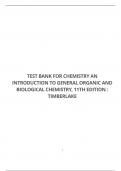
-
TEST BANK FOR CHEMISTRY AN INTRODUCTION TO GENERAL ORGANIC AND BIOLOGICAL CHEMISTRY, 11TH EDITION : TIMBERLAKE
- Exam (elaborations) • 22 pages • 2023
-
- $10.00
- + learn more
An Introduction to General, Organic, and Biological Chemistry, 11e (Timberlake) Chapter 1 Chemistry and Measurement 1.1 Multiple-Choice Questions 1) Water, H2O, is an example of a(n) ________. A) chemical B) solid C) wave D) electric charge E) element Answer: A Page Ref: 1.1 2) In this list, which substance can be classified as a chemical? A) salt B) sleep C) cold D) heat E) temperature Answer: A Page Ref: 1.1 3) One example of a chemical used in toothpaste is ________. A) ch...
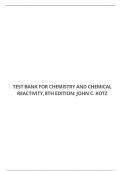
-
TEST BANK FOR CHEMISTRY AND CHEMICAL REACTIVITY, 8TH EDITION: JOHN C. KOTZ
- Exam (elaborations) • 20 pages • 2023
-
- $10.00
- + learn more
Chapter 1--Basic Concepts of Chemistry copy 1. A hypothesis is a A. mathematical formula that models a pattern of behavior. B. concise statement of a behavior that is always the same under the same conditions. C. set of experiments designed to test a theory. D. well-tested, unifying principle that explains a body of facts. E. tentative explanation or prediction based upon experimental observations. 2. A theory is a A. concise statement of a behavior that is always the same under the same...
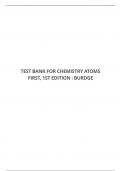
-
TEST BANK FOR CHEMISTRY ATOMS FIRST, 1ST EDITION : BURDGE
- Exam (elaborations) • 16 pages • 2023
-
- $10.00
- + learn more
Chapter 1: Chemistry: The Science of Change 1. What is a unifying principle that explains a body of experimental observations? A) Law B) Hypothesis C) Theory D) Phenomena E) Prediction Ans: C Difficulty: Easy 2. What is defined as a tentative explanation for observations that are made that result in the formulation of this concept? A) Law B) Hypothesis C) Theory D) Phenomena E) Prediction Ans: B Difficulty: Easy 3. What is term used for findings that are summarized based on a pattern or ...
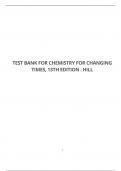
-
TEST BANK FOR CHEMISTRY FOR CHANGING TIMES, 13TH EDITION : HILL
- Exam (elaborations) • 32 pages • 2023
-
- $10.00
- + learn more
Chemistry for Changing Times, 13e (Hill) Chapter 1 Chemistry 1.1 Multiple Choice Questions 1) Which science is primarily concerned with the study of matter and the changes it undergoes? A) biology B) chemistry C) geology D) physics Answer: B Diff: 1 Page Ref: Sec. 1.1 LO: 1.1 2) What is natural philosophy? A) a belief in natural foods B) an experimental approach to philosophy C) an experimental approach to the study of nature D) theoretical speculation about nature Answer: D Dif...
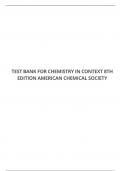
-
TEST BANK FOR CHEMISTRY IN CONTEXT 8TH EDITION AMERICAN CHEMICAL SOCIETY
- Exam (elaborations) • 56 pages • 2023
-
- $10.00
- + learn more
Chapter 01 - The Air We Breathe Multiple Choice Questions 1. Of five major gaseous components of air, which is the only one to vary significantly in concentration from place to place and from day to day? A. water vapor B. carbon dioxide C. nitrogen D. argon 2. Which two gases make up more than 95% of an inhaled breath? A. NO2 and N2 B. CO2 and O2 C. O2 and N2 D. N2 and Ar 3. What is the primary component of an exhaled breath? A. N2 B. O2 C. CO2 D. H2O
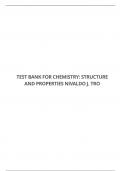
-
TEST BANK FOR CHEMISTRY: STRUCTURE AND PROPERTIES NIVALDO J. TRO
- Exam (elaborations) • 28 pages • 2023
-
- $10.00
- 1x sold
- + learn more
Chemistry: Structure and Properties (Tro) Chapter 1 Atoms 1.1 Multiple Choice Questions 1) An element has three stable isotopes with masses of 27.977 amu, 28.976 amu, and 29.973 amu. The heavier two isotopes have an abundance of 4.68% and 3.09%, respectively. What is the mass of the element? A) 27.684 amu B) 29.251 amu C) 28.085 amu D) 30.107 amu E) 28.991 amu Answer: C Diff: 5 Var: 1 Page Ref: 1.9 LO: 1.6 2) All of the following will lead to a homogeneous mixture except A) sugar ...
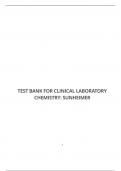
-
TEST BANK FOR CLINICAL LABORATORY CHEMISTRY: SUNHEIMER
- Exam (elaborations) • 13 pages • 2023
-
- $10.00
- + learn more
Test Bank Chapter 1 Laboratory Basics 1. Reverse osmosis (RO) is described as a process: A. In which water is forced through a semipermeable membrane that acts as a molecular filter. B. Used to purify liquid chemicals. C. In which water forced through a carbon filter eliminates organic solvents. D. In which salt in water moves through filter paper. 2. Activated carbon filters remove: A. Ions from water. B. Organic compounds from water. C. Acids and bases from water. D. Large particul...
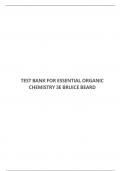
-
TEST BANK FOR ESSENTIAL ORGANIC CHEMISTRY 3E BRUICE BEARD
- Exam (elaborations) • 41 pages • 2023
-
- $10.00
- + learn more
Essential Organic Chemistry, 3e (Bruice) Chapter 3 An Introduction to Organic Compounds 1) Which of the following is a tertiary amine? A) B) C) D) E) Answer: E Diff: 1 Section: 3-1 Objective: G2, G3 LO: 3.2
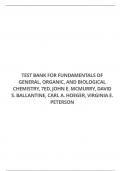
-
TEST BANK FOR FUNDAMENTALS OF GENERAL, ORGANIC, AND BIOLOGICAL CHEMISTRY, 7ED, JOHN E. MCMURRY, DAVID S. BALLANTINE, CARL A. HOEGER, VIRGINIA E. PETERSON
- Exam (elaborations) • 36 pages • 2023
-
- $10.00
- 1x sold
- + learn more
Fundamentals of General, Organic, and Biological Chemistry, 7e (McMurry) Chapter 1 Matter and Measurements 1) Which of the following is a chemical property? A) melting point B) mass C) flammability D) volume E) temperature Answer: C Diff: 1 Section: 1.1 2) All of the following are examples of matter except A) heat. B) air. C) water. D) salt. E) plants. Answer: A Diff: 1 Section: 1.1 3) Which of the following is a physical property? A) flammability B) conductivity C) abilit...
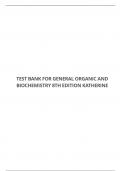

-
TEST BANK FOR GENERAL ORGANIC AND BIOCHEMISTRY 8TH EDITION KATHERINE
- Exam (elaborations) • 18 pages • 2023
-
- $10.00
- + learn more
Chapter 2: The Structure of the Atom and the Periodic Table 1. What are the three primary particles found in an atom? A) neutron, positron, and electron B) electron, neutron, and proton C) electron, proton, and nucleon D) positron, electron, and nucleon E) proton, electron, and neutrino Ans: B 2. What is the value of the mass number in the isotope 131 53I? A) 53 B) 78 C) 126.9 D) 131 E) 184 Ans: D 3. What term is used to describe atoms of the same element that have different mass...

How did he do that? By selling his study resources on Stuvia. Try it yourself! Discover all about earning on Stuvia


